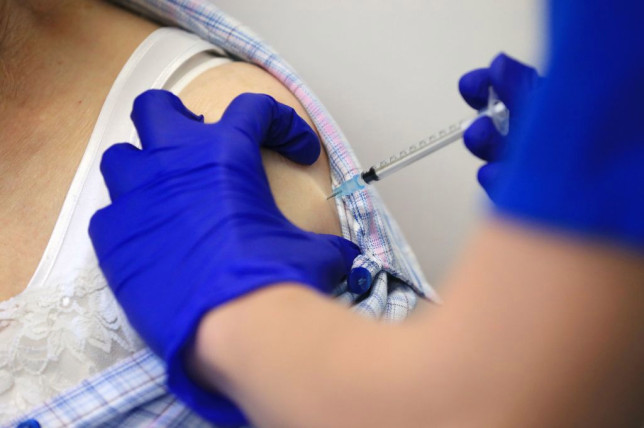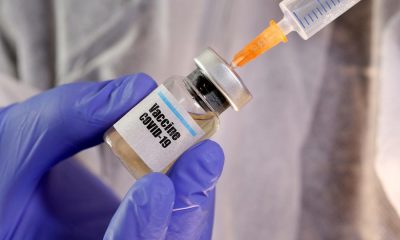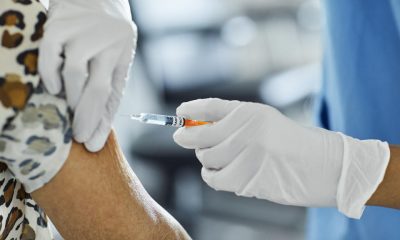Metro
Covid vaccine: Normal side effects, and when should you seek help?

The Covid-19 vaccine rollout continues across the UK – with a ‘rapid supply’ said to help over-30s get their first jabs by April. But with many of us about to receive the vaccine, it’s only natural to wonder what the common and not-so-common side effects are.
With reports that Oxford/AstraZeneca jabs have been paused in some countries to investigate the possibility of it causing blood clots, it’s also natural to wonder what’s going on there.
Try not to worry, though – as the European Medicines Agency and ITV’s Dr Khan have said there isn’t a connection. The Medicines and Healthcare Products Regulatory Agency (MHRA) here in the UK has also said it is unconfirmed.
Still, here’s everything you need to know about the Covid-19 vaccine’s side effects, and when to get medical help… What are the normal side effects of the Covid-19 vaccine? Mild symptoms lasting up to a week are considered normal, according to the NHS website.
These include: A sore arm where the needle was Feeling tired A headache Feeling achy Feeling or being sick. The MHRA asks those with mild side effects post-vaccine to report their symptoms on Yellow Card.
When should you seek help for Covid vaccine side effects? A temperature following the vaccine suggests you may have an infection – or indeed, coronavirus.
Monitor your symptoms and call 111 if you’re worried. The NHS states that if your symptoms worsen beyond ‘mild’, or drag on for longer than a week – call 111 straight away. If you’re really concerned about a symptom you have, trust your gut and call 111.
Once you’re able to do so, the MHRA asks those with abnormal, non-mild side effects post-vaccine to report their symptoms on Yellow Card.
Is there a connection between the Covid-19 vaccine and risk of blood clots? Recent reports state that Thailand, Norway, Denmark and Iceland have temporarily suspended use of the Oxford/AstraZeneca vaccine.
This is only while they investigate if the vaccine was the cause of a blood clot in a Danish patient. However, Dr Phil Bryan, MHRA Vaccines Safety Lead, said that this had not been confirmed, saying in a statement on the MHRA website: ‘Vaccine safety is of paramount importance and we continually monitor the safety of vaccines to ensure that the benefits outweigh any potential risks.
‘It has not been confirmed that the report of a blood clot, in Denmark, was caused by the COVID-19 Vaccine AstraZeneca.
‘The Danish, Norwegian and Icelandic authorities’ action to temporarily suspend use of the vaccine is precautionary whilst they investigate.
‘Blood clots can occur naturally and are not uncommon. More than 11 million doses of the COVID-19 Vaccine AstraZeneca vaccine have now been administered across the UK. Reports of blood clots received so far are not greater than the number that would have occurred naturally in the vaccinated population.
READ ALSO: Nigerian First-Class Graduate & PhD Student On Scholarship In Germany Commits Suicide
‘The safety of the public will always come first. We are keeping this issue under close review but available evidence does not confirm that the vaccine is the cause.’ What are the symptoms of a blood clot?
There is currently no evidence to suggest that the Oxford/AstraZeneca vaccine – or any Covid-19 vaccine – causes or increases risks of blood clots. Fortunately, blood clots are rare in healthy people, but it is a good idea to be aware of the symptoms, as listed by the NHS. They include: Throbbing pain Cramping pain Swelling, redness and warmth in a leg or arm Sudden breathlessness Sharp chest pain (sometimes worse when you inhale) A cough or coughing up blood.
Call 111 if you’re concerned about a blood clot. However, if the situation escalates, or if someone’s struggling to breathe or has passed out, skip 111 and call 999.
Those most at risk include: overweight people, smokers, pregnant women or women who’ve just given birth, people who have inflammatory conditions, women on hormonal birth control or people who have had a blood clot before. There is also a risk when you don’t move for a long period of time – such as when you’re staying in hospital after an operation, or on a long flight.
Send Us A Press Statement Advertise With Us Contact Us
And For More Nigerian News Visit GWG.NG










